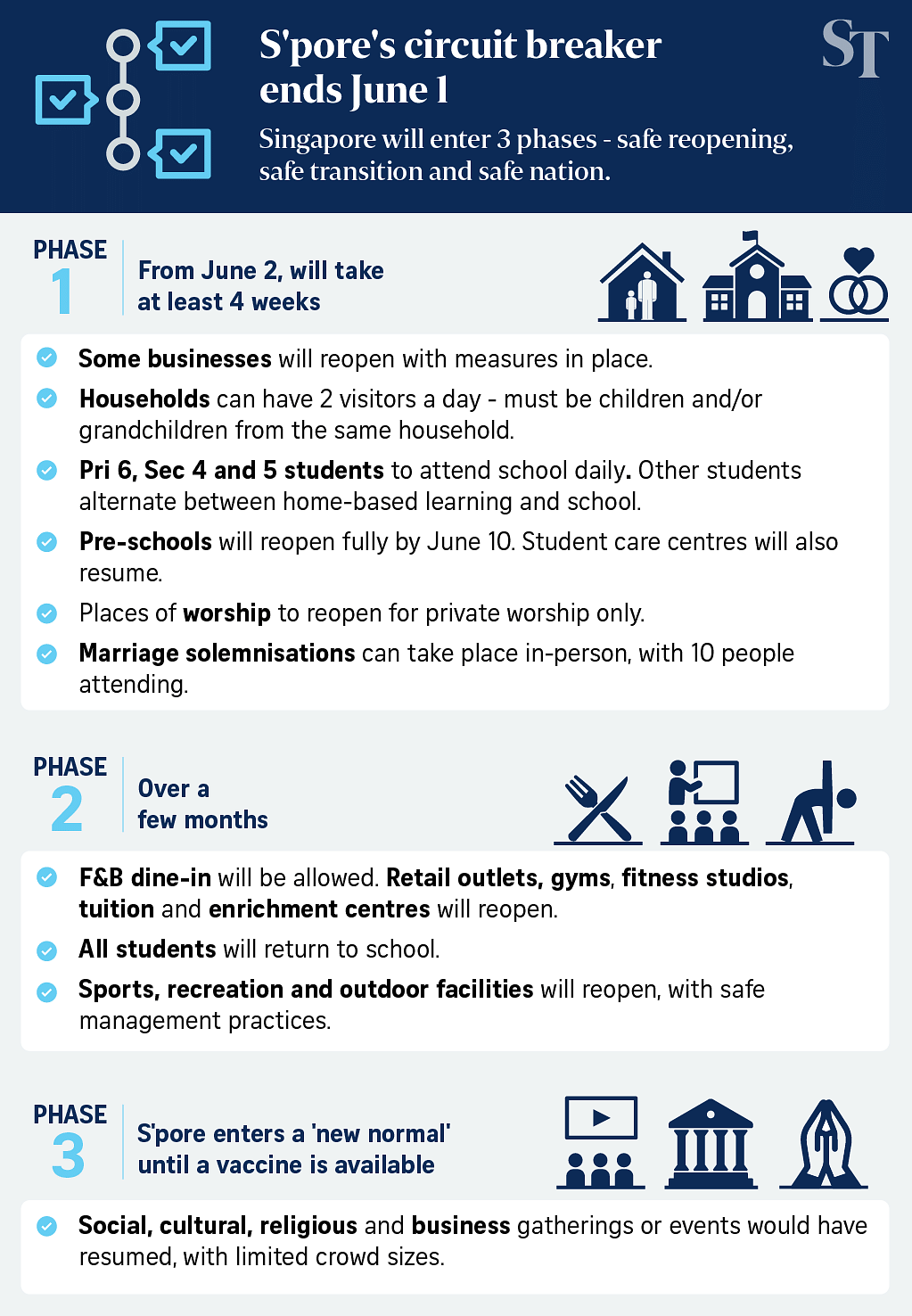SINGAPORE - Singapore's circuit breaker will formally end on June 1, the multi-ministry task force on the Covid-19 outbreak announced on Tuesday (May 19), saying the economy would then be reopened gradually in three phases.
At a virtual press conference, the task force outlined the broad plan to transition Singapore in phases out of its period of stringent measures eventually into a new normal that will be remain until an effective vaccine or treatment for Covid-19 is developed. But the ministers stressed that reopening plans are not a return to life before Covid-19.
Health Minister Gan Kim Yong also noted that phases could be rolled back should the outbreak flare up again. He also said that a rise in number of cases is likely as Singapore reopens.
"As we begin to resume more activities, we do expect to see a rise in daily cases... If we can continue to keep the situation under control, then we can reopen progressively," he said.
In the first phase, called "safe reopening", more people will be allowed to return to their workplaces, with priority given to critical sectors and businesses that operate in settings with lower transmission risks.
But those who are working from home should continue to work from home, said Trade and Industry Minister Chan Chun Sing. Only those who require machinery or specialised terminals will be able to return to the office, as well as those who need to complete legal documentation.
Pre-schools will also gradually reopen by levels, with full resumption by June 10. For primary and secondary schools, those in graduating cohorts will attend school daily, while the rest will rotate weekly.
Places of worship - closed during the circuit breaker - will be allowed to open next month, but only for private worship. Congregational services will not resume.
Social gatherings will also still be prohibited, although an exception will be made for people visiting their parents or grandparents. Visits will be limited to one per day, with a maximum of two visitors a day. These visitors should be from the same household.
This means that dropping off children for childcare will be allowed, although seniors themselves should not go out, Mr Gan said.
In this first phase, the risk of a resurgence in community transmission is high, he added. This means that people should continue wearing masks when they leave the house, and only go out for essential services.
The first phase is expected to last a few weeks and Singapore will move into the second phase if community transmission rates remain "low and stable" and the dormitory situation remains under control.
In the second phase, called the "safe transition", people will gradually be able to resume more social activities. More businesses will be allowed to reopen, including tuition and enrichment centres, gyms and fitness studios. However, employers must implement safe distancing measures and ensure that those who can work from home continue to do so.
In this phase, small social gatherings and dining in at food and beverage outlets could also be allowed.
Mr Gan said the second phase comprises several steps and could last several months.
Depending on the how the Covid-19 situation then develops, measures will continue to be eased further until the country reaches the third and final phase, called "safe nation".
In the third phase, Singapore will move to a "new normal" until a vaccine is found.
By this time, social, cultural, religious and business gatherings are expected to have resumed. However, limits will be put in place on gathering sizes.

The same applies to services and activities that involve significant prolonged close contact, such as massages, or significant crowd management risk in an enclosed space, such as cinemas.
On public transport, where it is difficult to maintain physical distancing, commuters will have to wear masks and refrain from talking.
National Development Minister Lawrence Wong said that while some might be disappointed that they will not be able to go out freely and socialise after the end of the circuit breaker, the reopening needs to be done carefully.
"We have to do this in a careful and calibrated manner as we don't want to risk a flaring up of virus. And importantly, we do not want to sacrifice the efforts all of us have put in controlling the outbreak," he said.
He added that the Government would continue to support businesses and workers that are unable to open on June 2.
Deputy Prime Minister and Finance Minister Heng Swee Keat has announced that he will deliver a ministerial statement on the plans on May 26. It will be the fourth Budget this year.











